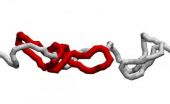(Press-News.org) Physicists have gained new insights into the inner intricacies of the structural variations of metallic nanoclusters. This work by Luca Pavan, Cono Di Paola and Francesca Baletto from King's College London, UK, is about to be published in EPJ D. It takes us one step closer to tailoring on-demand characteristics of metallic nanoparticles. Indeed, the geometric structure of these nanoclusters influences their chemical and physical properties, which differ from those of individual molecules and of bulk metals.
The problem resides in the difficulty in evaluating the optimal structure for such clusters in order to make them display specific properties and satisfy a particular technological need. This is because a system consisting of several interlinked atoms is far too complex for its optimal structure to be identified simply by resolving equations.
Instead, the authors applied a numerical simulation method, known as metadyamics, typically used to sample the energy landscape of biomolecules and proteins. This technique, quite new in the field of metallic nanoparticles, identifies structures corresponding to each minimum of the energy landscape. In addition, this approach gains a better insight into the interconnection of various structural motifs at given temperatures.
Specifically, this study describes an iterative approach for metadynamics in order to detect which are the key structures of 13-atom-strong platinum nanoclusters. The authors focused on identifying the most recurrent motifs that can play an important role during structural transformations of the nanoclusters.
In addition, the team proposed a complete way of cataloguing such structural motifs in families. The next step would be to understand how different geometrical shapes are connected and evaluate the energy cost for each transformation, from one type of geometry to another. Applications could, for example, be found in nanocatalysis and nanodevices for magnetic storage.
###
Reference
Pavan L., Di Paola C. and Baletto F. (2013), Sampling the Energy Landscape of Pt13 with Metadynamics, European Physical Journal D, DOI 0.1140/epjd/e2012-30560-y
For more information, please visit www.epj.org
The full-text article is available to journalists on request.
New taxonomy of platinum nanoclusters
The unexpected diversity of metallic nanoclusters’ inner structure has now been catalogued into families
2013-02-20
ELSE PRESS RELEASES FROM THIS DATE:
Molecular basis identified for tissue specific immune regulation in the eye and kidney
2013-02-20
Both AMD, which affects around 50 million people worldwide, and aHUS, a rare kidney disease that affects children, are associated with incorrectly controlled immune systems. A protein called complement factor H (CFH) is responsible for regulating part of our immune system called the complement cascade. Genetic alterations in CFH have been shown to increase a person's risk of developing either AMD or aHUS, but rarely both. Why this is the case has never been explained until now.
Researchers from the Wellcome Trust Centre for Cell Matrix Research and the Ophthalmology and ...
The nano-channel that disentangles knots
2013-02-20
The DNA, just like hair, has a tendency to become knotted, thus it may be useful to disentangle it.
Unfortunately, it is not possible to "actively" choose at random (or better, in one solution) the filaments with the desired features, and this is why scientists adopt "passive" solutions like, for instance, having the DNA pass through nano-pores or nano-channels.
"Channels and filaments have physical features we may exploit to selectively let a type of molecule pass through" explains Micheletti. "You can have more or less entangled filaments and featuring knots of different ...
New technology in the magnetic cooling of chips
2013-02-20
Luis Hueso, the CICnanoGUNE researcher, together with researchers from the University of Cambridge, among others, has developed a new technology in the magnetic cooling of chips based on the straining of materials. Compared with the current technologies, this advance enables the impact on the environment to be lessened. The work has been published recently in the prestigious journal Nature Materials.
Current cooling systems, be they refrigerators, freezers or air conditioning units, make use of the compression and expansion of a gas. When the gas is compressed, it changes ...
A self-healing protective coating for concrete
2013-02-20
Scientists are reporting development of what they describe as the first self-healing protective coating for cracks in concrete, the world's most widely used building material. Their study on the material — which is inexpensive and environmentally friendly — appears in the journal ACS Applied Materials & Interfaces.
Chan-Moon Chung and colleagues explain that protecting concrete roads, bridges and other structures from developing tiny cracks has been a major technological challenge. Cracks allow water, salt used for deicing and air to enter the concrete. During winter ...
New IOM report highlights PEPFAR's successes
2013-02-20
WASHINGTON -- The President's Emergency Plan for AIDS Relief (PEPFAR) has saved and improved millions of lives worldwide and offered proof that HIV/AIDS services can be effectively delivered on a large scale even in countries with high rates of disease and resource constraints, says a new congressionally mandated evaluation conducted by the Institute of Medicine.
Moving forward, PEPFAR needs to intensify efforts to help its partner countries develop the capacity to manage their own programs, sustain the gains that have been made in controlling the HIV epidemic, and improve ...
New imaging device that is flexible, flat, and transparent
2013-02-20
WASHINGTON, Feb. 20, 2013— Digital cameras, medical scanners, and other imaging technologies have advanced considerably during the past decade. Continuing this pace of innovation, an Austrian research team has developed an entirely new way of capturing images based on a flat, flexible, transparent, and potentially disposable polymer sheet. The team describes their new device and its possible applications in a paper published today in the Optical Society's (OSA) open-access journal Optics Express.
The new imager, which resembles a flexible plastic film, uses fluorescent ...
Can insurers save money by providing free diabetes-related medications and supplies?
2013-02-20
New Rochelle, NY, February 20, 2013–Reducing financial barriers to medication access—a strategy known as value-based insurance design (VBID)—can improve medication adherence and management of chronic diseases such as diabetes. The economic and patient-perceived benefits of eliminating co-payments for diabetes-related medications and supplies are described in a trend-setting study published in Population Health Management, a peer-reviewed journal from Mary Ann Liebert, Inc., publishers. The article is available free on the Population Health Management website at http://www.liebertpub.com/pop.
In ...
Ancient 'Egyptian blue' pigment points to new telecommunications, security ink technology
2013-02-20
A bright blue pigment used 5,000 years ago is giving modern scientists clues toward the development of new nanomaterials with potential uses in state-of-the-art medical imaging devices, remote controls for televisions, security inks and other technology. That's the conclusion of an article on the pigment, Egyptian blue, in the Journal of the American Chemical Society.
Tina T. Salguero and colleagues point out that Egyptian blue, regarded as humanity's first artificial pigment, was used in paintings on tombs, statues and other objects throughout the ancient Mediterranean ...
6 in 10 people worldwide lack access to flush toilets or other adequate sanitation
2013-02-20
It may be the 21st century, with all its technological marvels, but 6 out of every 10 people on Earth still do not have access to flush toilets or other adequate sanitation that protects the user and the surrounding community from harmful health effects, a new study has found. The research, published in ACS' journal Environmental Science & Technology, says the number of people without access to improved sanitation is almost double the previous estimate.
amie Bartram and colleagues explain that the current definition of "improved sanitation" focuses on separating humans ...
Trustworthy mating advice deepens bond between straight women and gay men
2013-02-20
Why do straight women and gay men form close relationships with one another? A new psychology study from The University of Texas at Austin suggests the glue that cements these unique relationships is honest, unbiased relationship advice.
The study, published online in the February issue of Evolutionary Psychology, is the first to provide empirical evidence that the emotional closeness shared by straight women and gay men is rooted in the absence of deceptive mating motivations.
"Friendships between straight women and gay men are free of hidden mating agendas," says ...
LAST 30 PRESS RELEASES:
Tiny bubbles, big breakthrough: Cracking cancer’s “fortress”
A biological material that becomes stronger when wet could replace plastics
Glacial feast: Seals caught closer to glaciers had fuller stomachs
Get the picture? High-tech, low-cost lens focuses on global consumer markets
Antimicrobial resistance in foodborne bacteria remains a public health concern in Europe
Safer batteries for storing energy at massive scale
How can you rescue a “kidnapped” robot? A new AI system helps the robot regain its sense of location in dynamic, ever-changing environments
Brainwaves of mothers and children synchronize when playing together – even in an acquired language
A holiday to better recovery
Cal Poly’s fifth Climate Solutions Now conference to take place Feb. 23-27
Mask-wearing during COVID-19 linked to reduced air pollution–triggered heart attack risk in Japan
Achieving cross-coupling reactions of fatty amide reduction radicals via iridium-photorelay catalysis and other strategies
Shorter may be sweeter: Study finds 15-second health ads can curb junk food cravings
Family relationships identified in Stone Age graves on Gotland
Effectiveness of exercise to ease osteoarthritis symptoms likely minimal and transient
Cost of copper must rise double to meet basic copper needs
A gel for wounds that won’t heal
Iron, carbon, and the art of toxic cleanup
Organic soil amendments work together to help sandy soils hold water longer, study finds
Hidden carbon in mangrove soils may play a larger role in climate regulation than previously thought
Weight-loss wonder pills prompt scrutiny of key ingredient
Nonprofit leader Diane Dodge to receive 2026 Penn Nursing Renfield Foundation Award for Global Women’s Health
Maternal smoking during pregnancy may be linked to higher blood pressure in children, NIH study finds
New Lund model aims to shorten the path to life-saving cell and gene therapies
Researchers create ultra-stretchable, liquid-repellent materials via laser ablation
Combining AI with OCT shows potential for detecting lipid-rich plaques in coronary arteries
SeaCast revolutionizes Mediterranean Sea forecasting with AI-powered speed and accuracy
JMIR Publications’ JMIR Bioinformatics and Biotechnology invites submissions on Bridging Data, AI, and Innovation to Transform Health
Honey bees navigate more precisely than previously thought
Air pollution may directly contribute to Alzheimer’s disease
[Press-News.org] New taxonomy of platinum nanoclustersThe unexpected diversity of metallic nanoclusters’ inner structure has now been catalogued into families


